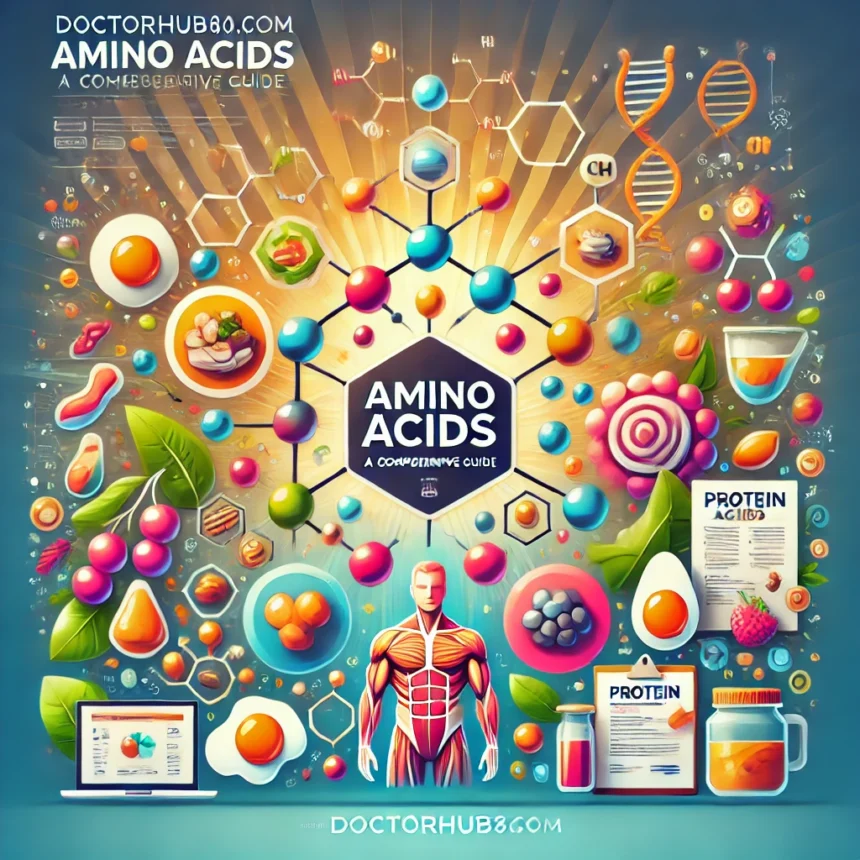Amino acids are the essential building blocks of life, playing a fundamental role in protein synthesis, muscle growth, immune function, and overall health. Whether obtained through diet or supplementation, these organic compounds are vital for maintaining bodily functions and optimizing wellness. This article explores amino acids in detail, their classifications, benefits, sources, and the importance of balanced intake.
Table of Contents
ToggleWhat Are Amino Acids?
Amino acids are organic compounds composed of carbon, hydrogen, oxygen, and nitrogen. They link together to form proteins, which are crucial for the body’s structural and functional integrity. In addition to building proteins, amino acids contribute to various physiological processes such as neurotransmitter production, hormone regulation, and immune response.
The human body relies on amino acids for growth, repair, and energy production. Since proteins are constantly being broken down and synthesized, an adequate intake of amino acids is necessary for maintaining health and preventing deficiencies.
Types of Amino Acids
Amino acids are categorized into three main groups based on whether the body can synthesize them:
Essential Amino Acids
Essential amino acids cannot be produced by the body and must be obtained through dietary sources. There are nine essential amino acids:
- Histidine – Plays a role in immune function and the production of histamine.
- Isoleucine – Supports muscle metabolism and immune system function.
- Leucine – Aids in protein synthesis and muscle repair.
- Lysine – Essential for tissue growth and the absorption of calcium.
- Methionine – Helps in detoxification and tissue repair.
- Phenylalanine – Precursor to neurotransmitters like dopamine and serotonin.
- Threonine – Important for collagen and elastin production.
- Tryptophan – Helps regulate mood and sleep by supporting serotonin production.
- Valine – Supports energy production and muscle recovery.
Non-Essential Amino Acids
Non-essential amino acids are synthesized by the body, making dietary intake less critical. However, they still play significant roles in metabolism and overall health. Some important non-essential amino acids include:
- Alanine – Involved in glucose metabolism and energy production.
- Arginine – Supports blood flow and immune function.
- Aspartic Acid – Aids in energy production and neurotransmitter function.
- Cysteine – Contributes to antioxidant production.
- Glutamine – Crucial for gut health and immune support.
- Glycine – Plays a role in collagen formation and neurotransmission.
- Proline – Supports skin and connective tissue health.
- Serine – Aids in brain function and nervous system regulation.
- Tyrosine – Serves as a precursor to dopamine, epinephrine, and norepinephrine.
Conditional Amino Acids
Conditional amino acids are typically non-essential but may become essential under specific conditions such as illness, stress, or trauma. These include arginine, cysteine, glutamine, and tyrosine, which are often supplemented in cases of malnutrition or medical conditions.
Benefits of Amino Acids
Amino acids offer a wide range of health benefits, from muscle recovery to mental well-being. Here are some key advantages:
Muscle Growth and Recovery
Branched-chain amino acids (BCAAs) like leucine, isoleucine, and valine are essential for muscle protein synthesis and recovery after exercise. They help reduce muscle soreness, improve endurance, and prevent muscle breakdown.
Enhanced Brain Function
Amino acids like tryptophan and tyrosine are precursors to neurotransmitters that regulate mood, cognition, and mental focus. Tryptophan is converted into serotonin, which promotes relaxation and sleep, while tyrosine supports dopamine production for motivation and alertness.
Immune System Support
Amino acids such as glutamine and arginine are essential for immune function. They assist in the production of white blood cells, support gut health, and enhance the body’s ability to fight infections.
Improved Metabolism and Weight Management
Amino acids play a role in fat metabolism and energy production. Methionine and lysine help break down fats, while leucine promotes lean muscle mass, which increases metabolic rate.
Skin, Hair, and Nail Health
Collagen is composed of amino acids like glycine, proline, and hydroxyproline, which contribute to skin elasticity, hair strength, and nail growth. Proper amino acid intake can help reduce signs of aging and improve skin hydration.
Dietary Sources of Amino Acids
Ensuring a balanced intake of amino acids through diet is essential for overall health. Some of the best dietary sources include:
Animal-Based Sources
- Meat – Beef, chicken, pork, and lamb provide complete proteins.
- Fish and Seafood – Salmon, tuna, shrimp, and shellfish are rich in essential amino acids.
- Eggs – A complete protein source with all essential amino acids.
- Dairy Products – Milk, cheese, and yogurt contain high-quality proteins.
Plant-Based Sources
- Legumes – Beans, lentils, and chickpeas provide a good amount of protein.
- Nuts and Seeds – Almonds, chia seeds, flaxseeds, and pumpkin seeds contain essential amino acids.
- Whole Grains – Quinoa, brown rice, and oats contribute to a balanced protein intake.
- Soy Products – Tofu, tempeh, and edamame are complete plant-based proteins.
Amino Acid Supplements
For individuals who struggle to meet their amino acid requirements through diet alone, supplements can be a convenient option. Common types include:
BCAA Supplements
BCAAs (leucine, isoleucine, valine) are widely used in sports nutrition to promote muscle growth and endurance. They are often consumed before or after workouts.
Whey Protein
Whey protein is a complete protein source that provides all essential amino acids, making it popular among athletes and fitness enthusiasts.
Glutamine Supplements
Glutamine is often taken to support gut health, boost immunity, and aid in post-workout recovery.
Essential Amino Acid (EAA) Supplements
EAA supplements provide a full spectrum of essential amino acids, beneficial for individuals on restrictive diets or those with higher protein needs.
Importance of Balanced Amino Acid Intake
While amino acids are crucial for health, an imbalance can lead to deficiencies or adverse effects. Excessive intake of certain amino acids, particularly through supplementation, may cause digestive discomfort, kidney strain, or imbalances in neurotransmitter production. It’s essential to maintain a varied and balanced diet that provides all necessary amino acids.
Consulting with a healthcare professional before taking amino acid supplements is advisable, especially for individuals with medical conditions, dietary restrictions, or athletic goals.
Read also: Crypto30x.com: Navigating the Ocean of Cryptocurrency Opportunities
Conclusion
Amino acids are vital for numerous bodily functions, from muscle growth to cognitive health. Whether through dietary sources or supplementation, maintaining adequate amino acid intake is essential for overall well-being. By understanding the roles, benefits, and sources of amino acids, individuals can optimize their health and achieve better physical and mental performance.
For more information on amino acids, supplementation, and health tips, visit doctorhub360.com and explore expert advice on nutrition and wellness.







